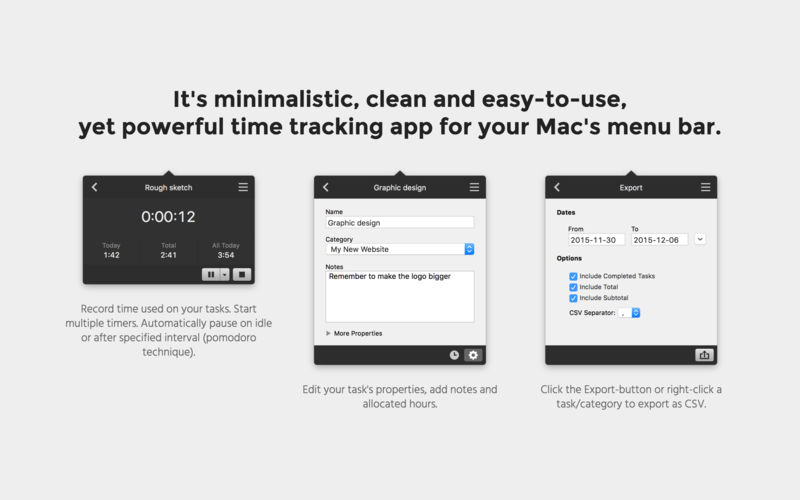DOWNLOAD Simple Task Timer 0.3.1 for Windows. Simple Task Timer 0.3.1 add to watchlist send us an update. 4 screenshots: runs on: Windows All file size: 8.6 MB filename. Cron format is a simple, yet powerful and flexible way to define time and frequency of various actions. NnCron make active use of cron format in both classic and extended modes. Traditional (inherited from Unix) cron format consists of five fields separated by white spaces. Preset timer for one hour three minute. Allows you to countdown time from 1 hour 3 min to zero. Easy to adjust, pause, restart or reset. 1 hour 3 minute equal 3780000 Milliseconds. 1 hour 3 minute equal 3780 Seconds. 1 hour 3 minute is about 63 Minutes.
Hr Task Timer 1 30
BN-LINK Heavy Duty Mechanical 24 Hour Timer Dual Outlet 3-Prong Accurate Indoor for Lamps Fans Christmas Lights White AC 1875W 1/2 HP, UL Listed VIVOSUN Short Period Repeat Cycle Timer Intermittent Timer 3 Cycle Mode for Day, Night, 24 Hour.
Over the week-end I created the TaskTimer class that allows to execute code on timer in an async method:
Hr Task Timer 1 36
Source code: https://github.com/ikriv/tasktimer
Nuget package: https://www.nuget.org/packages/TaskTimer/1.0.0
Motivation
To my astonishment, I have found that .NET Task Library does not (seem to) have support for executing a task on timer, similar to Observable.Interval(). I needed to execute an activity every second in my async method, and the suggestions I found on StackOverflow were quite awful: from using Task.Delay() to using a dedicated thread and Thread.Sleep(). https://bestnfil833.weebly.com/mp4tools-3-3-7-download-free.html.
Task.Delay() is good enough in many cases, but it has a problem. Consider this code:
One execution of the loop takes 1300ms on average, instead of 1000ms we wanted. So, on every execution we will accumulate an additional delay of 300ms. If DoSomething() takes different time from iteration to iteration, our activity will not only be late, but it will also be irregular. One could, of course, use real-time clock to adjust the delay after every execution, but this is quite laborious and hard to encapsulate.
Using TaskTimer
Browser for 'TaskTimer' package on NuGet and add it to your project. Alternatively, you can get the code from GitHub. The code requires .NET 4.5 or above.
You will need to choose the timer period, and the initial delay, or absolute start time:
The returned object is a disposable enumberable. You must call Dispose() on it to properly disposer of the underlying timer object. The enumerable iterates over an infinite series of tasks. Task number N becomes completed after the timer ticks N times. The enumerable can be enumerated only once.
Avoiding infinite loop
The enumerable returned by the timer is infinite, so you cannot get all the task at once. Rightfont 3 1 0 download free.
You can use foreach on the timer, but that would be an infinite loop:
1blocker mac crack. If you know the number of iterations in advance, use Take() method:
If you don't, you can use a cancellation token:
About Disposable Enumerable
I initially implemented the timer sequence as generator method using the yield keyword. You can see this in the GitHub history:
The trouble with this approach was that calling the Start() method did not actually start the timer: the timer would be started only when one begins to iterate over it. Furthermore, each iteration will create a new timer. Mercury bigfoot 60 2017 service manual. I found this too confusing. I had enough trouble understanding similar behavior in observables to inflict this on the users of my own class.
So, I decided to switch to a schema where the timer gets started immediately upon calling of the Start() method. In reactive terms, TaskTimer is a hot observable. To stop the timer, one needs to dispose the return value of the Start() method, hence the disposable enumerable. To use the timer properly, one should put a foreach loop inside a using block like in the examples, above.
Also, it is only possible to iterate over the timer once. The following will not work:
It should be possible to implement a timer with multiple iteration semantics, but I decided it was not worth the complexity.
Conclusion
It's a shame Task Library does not provide timer object out of the box. I hope I was able to fill the gap, at least to some extent. In the process I ran into interesting problems with the way IEnumerable, IEnumerator and IDisposable intersect, this is a fascinating world. I hope you do enjoy the result!
How to track time you spend on daily tasks
Step 2Set up tasks and projects
Pixelmator 3 7 4. Create tasks and to-dos on projects, and categorize projects by client. Then, all you have to do is choose a project/task, write an optional description of what you're doing, and start the timer.
Step 3Install app and track time spent on tasks
You can track time online in the browser, or via desktop and mobile app (iOS, Android, Mac, Windows, Linux). In addition to convenience, apps also come packed with useful time tracking features like reminders, idle detection, and more.
Step 4Track time inside other apps
Install Chrome or Firefox extension and a timer button will appear in your favorite online web apps so you can track time more easily (Trello, Asana, Todoist, etc.). Maccleanse 5 1 3 download free.
Step 5Set hourly rates
Set hourly rates for projects. Then, mark tracked time as billable and Clockify will automatically calculate the billable amount.
Step 6Compare estimated vs real time
Set estimates for projects and tasks, and then see how much time you really spend on activities.
Step 7
Export reports

Export reports
You can run an online report and break down time tracking data however you need. When the time comes, export the report as PDF, Excel, or CSV, or share a link to the report with your client.
Download report samples: PDF • CSV • Excel
